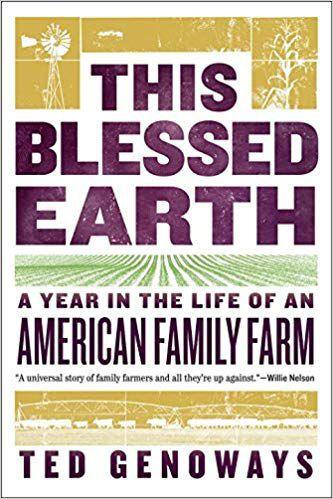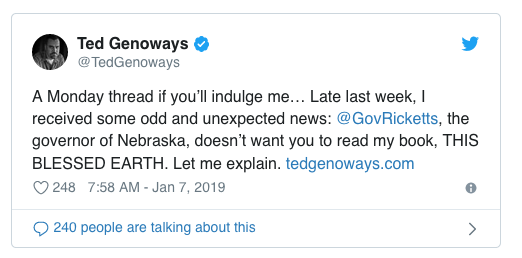Omaha World-Herald: ‘One Nebraska’ book on farm family is divisive, won’t get proclamation, Ricketts says; author calls move ‘shocking’
by Aaron Hegarty / World-Herald staff writer | January 8, 2018
Since 2005, the Nebraska Center for the Book has had its annual “One Book One Nebraska” selection recognized by the governor.
Not this year. The book selected was “This Blessed Earth: A Year in the Life of an American Family Farm,” which follows the life of Rick Hammond, a York County farmer.
“The book that they are proposing was written by a political activist that really seemed to be out of touch,” Gov. Pete Ricketts said Monday. It “was not going to be something that was going to unify Nebraska.”
The author, Ted Genoways, voiced surprise and concern in a Twitter thread Monday morning, when the proclamation ceremony would have been held.
Genoways told The World-Herald, “I think it’s really disappointing and shocking that the governor would say he doesn’t want the people of Nebraska to hear from a farm family that’s been confronting major issues, and to hear their thoughts as they work through them and try to keep the farm in the family for the next generation.”
The Nebraska Center for the Book, an affiliate of the Library of Congress, made its selection in October. Each year, it chooses a book with a tie to Nebraska.
“It’s an award-winning book,” said Rod Wagner, director of the Nebraska Library Commission. “It’s received national attention. Of course there are ideas in the book that people will not agree to, but I think that’s also a reason why it makes for a good one to consider and discuss.
“It’s a contrast of the modern farm with that of 40 years ago. It’s one that’s a subject of interest across Nebraska. People who have disagreements with ideas in the book will be able to talk about those.”
Ricketts said he has not read Genoways’ book. He said “One Book” organizers can pick any author they want, but “I also decide who I’m going to do proclamations for.”
He added, “If you just go look, this author has been a political activist, has been very critical of our national leaders and so forth, and not really saying things that are going to bring Nebraskans together, but really trying to be somebody who is more divisive.”
Genoways said he’s been “pointed at times” with people in powerful positions, but he doesn’t see himself as divisive.
“I do see that as the role of a responsible journalist and writer,” Genoways said. Nebraska’s farmers and ranchers “barely have money to make their payments, much less try to launch a PR campaign even on their own behalf. I see it as my responsibility to be out and providing a megaphone to the people who don’t get heard otherwise.”
Monday afternoon during the governor’s monthly radio show, a caller named Mary Ann from Lincoln criticized Ricketts’ decision, saying “it smacks of censorship and sounds like Nebraskans shouldn’t read opinions that aren’t opinions you agree with.”
Ricketts responded that he doesn’t want his name on a proclamation promoting the book but has not told anybody not to read it.
Later in the show, a caller named Teresa from Callaway offered her support for the governor’s decision not to sign the proclamation.
“I’m proud that you refused to sign that because our country is divided enough,” she said. “I thank you for standing up with our president.”
The Lincoln-based Genoways has done other reporting in Nebraska. For The New Republic, he wrote that environmentalists joined forces “with xenophobes and racists” to oppose a Costco chicken plant being built near Fremont. Ricketts also probably didn’t like Genoways’ reporting on a Nebraska execution, the writer said, or that the family in “This Blessed Earth” opposes the Keystone XL pipeline, which the governor supports.
“Various branches of my family have lived in Nebraska since 1851,” Genoways said. “I’d consider that to be fairly in touch with Nebraska. … I’ve covered a lot of ag and rural issues in Nebraska for a number of years.”
The Nebraska Center for the Book is a nonprofit but is a state government-supported organization. It is housed at and supported by the Nebraska Library Commission. A committee typically receives nominations, reads the books and comes up with a short list, and the Center for the Book board makes the final choice.
This year, however, the Nebraska committee worked with a committee for the “All Iowa Reads” program to select a book of common interest to both states. The two state associations plan a joint conference in October.
“A significant factor is that both states have a significant farm economy,” Wagner said. “Farming is central to both states, and that was a subject of this book. It was for that reason one that came up as a common choice for the two states.”
World-Herald staff writers Martha Stoddard, Micah Mertes and Erin Grace contributed to this report.

